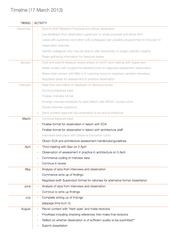|
As always, a useful meeting with Clara this afternoon. As always some valuable to-the-point feedback. In Clara's view my proposed plan was interesting but a bit boring. Instead we talked through how I might make it more interesting and exciting as piece of work. Perhaps the relationship between feedforward and multimodality could be the missing element to turn a somewhat dull idea into an interesting one. Basically, I need to be more creative and imaginative.
How multimodality shapes feedforward and how feedforward can shape multimodality. The relationship between the two. The literature review could go something like. Begin by acknowledging how pedagogical and technological developments are changing the nature of online assessment. Go on to say that assessment is a form of creative crisis (as per the manifesto project). Highlight the fact that there has already been some work on multimodality in assessment. Then go on to say how there has also been some discussion of how multimodality impacts upon feedback practices. Follow this up by saying that the relationship between multimodality and feedforward has been under-researched and therefore an opportunity exists to add to the discourse on this subject. How does multimodality make us think about feedforward. Or maybe I should ask how does multimodality encourage us to rethink feedforward. This would be a piece of action research. Using the literature, I would devise a system of multimodal feedforward that would be implemented to an existing course. I would develop the method of feedforward. It could be audio feedforward, for instance. The proposed plan would be rooted in literature. It would be put into practice within a course. I would then observe how it worked in practice. This would involve observing the use of feedforward and/or peer feedforward. Research questions could be: Is it effective and how effective is it? Or is it about other things such as peer relationships and conneurship. Timing-wise, it would be unrealistic to aim for a January course - it's too soon. Better instead to aim for a course beginning next September. An alternative might be to look for a summer course. It might be difficult to demonstrate how the proposed method of multimodal feedforward would impact upon marks. There might also be ethical issues with viewing student's marks. An alternative might be look at the Academic Writing course that Christine Sinclair runs. There are a number of advantages to this. I know Christine. I know the course. There's an argument that it might be easier to get approval for a course of this kind where assessment is not linked towards grading or subsequent progression through a programme. There are potential weaknesses however. The course might be too short to observe any impact of my proposed approach. An alternative might be to use my connection with DEI to identify a willing course programme. A potential downside to this however would be that, in my opinion, programme leaders might be less willing to 'experiment' in an exercise that is linked to formal assessment. Furthermore, I don't know any programme leaders and I would be therefore putting my trust - and the jeopardy of my project - in the hands of someone unknown to me. I would need to go back to multimodality to demonstrate my understanding of what this means. Tutors in art and music already work with multimodal work. In terms of feedforward, the crit offers an interesting example. Feedforward hasn't gained the traction that it should have therefore this has value and currency in terms of its practical professional application. In Clara's view, if I was to follow this route it might be possible to get Dai Hounsell to act as a co-supervisor which would clearly be valuable. It might also contribute to a piece of work that would be closer to publishable.
0 Comments
Leave a Reply. |
Categories
All
Archives
October 2013
TimelineOther stuff
|
